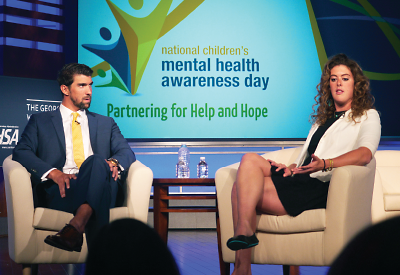“For the longest time, I was really good at compartmentalizing things so I never had to deal with them. That brought me to a point in my life when I was at an all-time low. I remember sitting in my room alone for four or five days, wanting only to kill myself. ... It was then I realized I needed help, and I couldn’t do it alone.”
Those are the words of Olympic swimmer Michael Phelps, the most decorated Olympian in history, at a special event last month celebrating National Children’s Mental Health Awareness Day. The event, of which APA was a partner, was sponsored by the Substance Abuse and Mental Health Services Administration (SAMHSA) and held at George Washington University in Washington, D.C. Phelps and close friend Allison Schmitt, also an Olympic medalist swimmer, served as honorary chairs.
Phelps and Schmitt spoke of their own experience with mental illness and seeking treatment that helped them move toward recovery. They emphasized the importance of modeling for children that, as Schmitt said, “It’s OK not to feel OK.” Schmitt sought care for depression following the suicide of a 17-year-old cousin. “I’ve become passionate about mental health,” she said.
“Communication is so important, and we make it harder than it needs to be,” Phelps said. “Teaching kids to be aware of their emotions and aware that it is OK to talk about their feelings—I think that is very powerful.”
The national event, viewable on the SAMHSA website, especially emphasized the importance of integrated behavioral and general health care and highlighted community programs supported by SAMHSA that employ coordinated systems that address children’s health holistically.
“Often families have to go through a dozen or more agencies to get help,” said Paolo del Vecchio, M.S.W., director of SAMHSA’s Center for Mental Health Services. “Too often they fall through the cracks. What we really need is comprehensive, coordinated care models that use a team-based approach with a centralized contact to provide individualized patient care.”
Child psychiatrist Adair Parr, M.D., representing APA at the event, spoke about her experience working with Potomac Pediatrics, a group practice in Rockville, Md., where she is implementing an integrated/collaborative care model to care for children with emotional and behavioral health needs. Parr received training from APA in collaborative care. She told the audience that the collaborative care model promises to extend quality mental health care through the collaboration of psychiatrists with primary care physicians to millions of people who otherwise might not receive care.
“I work with the pediatrician and nurse care manager to help primary care manage anxiety and depression,” Parr said. “We are also able to identify patients who are not progressing toward recovery, and who need the more intensive attention I can provide. It’s a great way to provide access quickly to patients who do not otherwise have access to a child psychiatrist.”
Parr cited the example of a teenage patient who came in for a well-child visit and was screened for depression using the PHQ-9. The screen identified suicidal thoughts in the patient requiring psychiatric care. “It’s an example of how our system was able to identify a young person who really needed help and might otherwise go without it,” she said. “As a child and adolescent psychiatrist, I have been trained to look at the medical, psychological, and social determinants of children’s health in the context of the whole family.”
Also attending the event was Health and Human Services (HHS) Secretary Tom Price, M.D., who presented Phelps and Schmitt with the 2017 SAMHSA Special Recognition Award. Price said HHS, under the Trump administration, was prioritizing serious mental illness, childhood obesity, and substance use disorders.
“These three interrelated problems are among our country’s most pressing challenges, requiring public and private collaboration and a commitment to prioritizing evidence-based systems of care,” Price said. He cited evidence from SAMHSA’s National Survey on Drug Use and Health showing that adolescents who have diabetes or are overweight are more likely than their peers to experience depression.
In presenting the awards to Phelps and Schmitt, Price hailed their outspoken support of SAMHSA’s efforts. “Michael and Allison’s stories are so important because they prove that mental illness impacts people of all backgrounds, even those who appear to have it all.” Price added that an athlete’s success is “is determined less by the strength of [one’s] body than the resilience of [one’s] mind. … Michael and Allison are living proof of this fact.” ■
A webcast of the SAMHSA event can be accessed
here.

